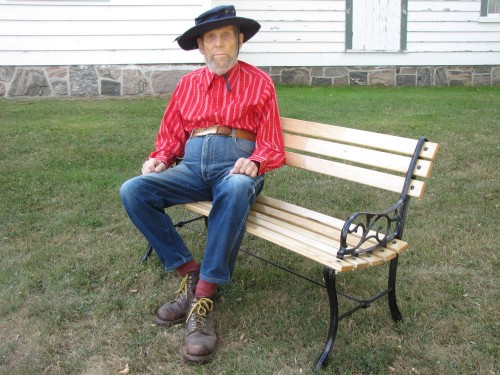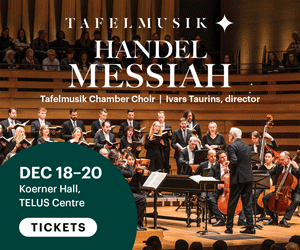 This month’s column is a very different perspective on the current status of music in our part of the world. There is no point in discussing in generalities the coronavirus pandemic. We have heard enough about it. As a columnist friend, Roger Varley, who writes for Cosmos, a weekly community newspaper in Uxbridge, recently remarked, “It’s rather like going to a Luciano Pavarotti concert only to hear him sing Nessun Dorma over and over again for two hours.” Instead, let’s have a more specific look at how this pandemic is affecting our musical world, starting by dividing our musical world into two groups: performers and listeners (with, hopefully, almost all performers being listeners to forms of music other than that which they perform). The coronavirus has forced us all into quarantine.
This month’s column is a very different perspective on the current status of music in our part of the world. There is no point in discussing in generalities the coronavirus pandemic. We have heard enough about it. As a columnist friend, Roger Varley, who writes for Cosmos, a weekly community newspaper in Uxbridge, recently remarked, “It’s rather like going to a Luciano Pavarotti concert only to hear him sing Nessun Dorma over and over again for two hours.” Instead, let’s have a more specific look at how this pandemic is affecting our musical world, starting by dividing our musical world into two groups: performers and listeners (with, hopefully, almost all performers being listeners to forms of music other than that which they perform). The coronavirus has forced us all into quarantine.
Performers
The regulations now in effect, affect music makers in several ways. First, as they stand, the laws have closed all possible locations where groups might rehearse or perform until further notice. Second, even if there were places, no groups larger than five individuals, other than those who live in the same location, are permitted to assemble. Third, all people in a group must maintain a separation of at least two metres.
For performers in bands, orchestras and choirs there are two major reasons why they regularly rehearse and perform. Yes, they are individuals who love to make music, but even more important, to make it with others. The social component is now missing. Many isolated members of bands, orchestras and choirs have now turned to their computers, cell phones and other electronic devices. They now socialize, play and sing with such Internet applications as Zoom and others. While far from the real thing, these help to maintain, at least, the social element of performing with friends.
Having observed a number of such online rehearsals of choral groups, the musical outcome is rarely of concert quality, or even rehearsal quality. On the other hand, with a suitably skilled individual orchestrating the event, and some means of synchronizing all parts, it can be quite satisfying for all participants. In most cases that I have seen, individual participants have been singing while filming themselves with their cell phones. I can’t imagine attempting an online band rehearsal with tuba or trombone players taking selfies while playing.
Listeners
As for online listening, I have seen an amazing (and amusing) variety of both animated and live selections. There are three performances which have captivated my attention enough to warrant returning to them periodically.
For a start I suggest a visit to a most entertaining performance of Erik Satie’s Gymnopédies on YouTube, performed by the Cats and Friends Choir. Featuring the distinctive vocal sounds of cats, cows and sheep, the rendition is, to put it mildly, unique.
Just about the most entertaining musical work that I have heard and seen on the Internet is a rendition of Beethoven’s Fifth Symphony, featuring a full symphony orchestra broadcast in the format of a major football or hockey game. All of the orchestra members, including the conductor, have numbers on their backs. Moving about, all over the stage, is a referee in his striped jersey. When an orchestra member plays a wrong note, the referee raises his flag, gives him a penalty and sends him off stage. As in a team sports event, there is a box at the rear of the hall with two commentators discussing the performance. In the opening of this work, when the first four-note phrase is repeated, the commentators discuss why that phrase was repeated. So it goes throughout. For this one google PDQ Bach, Beethoven 5th and you will find it.
Another humorous performance is by the Competitive Foursome two violins, a cello, and piano engaged in the most amazing athletic manoeuvres while performing. To see this one: google Wettstreit zu viert.
For those without Internet access, there have been many excellent programs on TV and radio. On Easter Sunday I had the pleasure of seeing and hearing Andrea Bocelli, the blind Italian opera-singing icon, performing at the Duomo di Milano, the cathedral church of Milan in Italy. There he was standing alone with only the organist accompanying him. While he did sing other numbers, I will never forget his rendition of César Franck’s Panis Angelicus.
Invited by the city of Milan and the church to spread a message of positivity, love and hope through the power of music, Bocelli, broke two of YouTube’s biggest records: the biggest classical livestream event in the website’s history; and also its biggest musical livestream of all time. According to Variety, that Music For Hope concert reportedly was seen and heard by more than 2.8 million “peak concurrent viewers” across the globe while it was actually happening.
Reminiscing
For no particular reason, with so many musical activities curtailed for a while, I found myself exploring the deeper crevices of my brain known as the Reminiscence Department, where I found my way to radio feature programs of the 30s and 40s. In other words, pre-TV. For years one of the most popular radio programs was Major Bowes’ Amateur Hour where once a week, amateur musical performers competed. If below a suitable standard, the Major hammered the Gong, and that competitor was gone. I remember one broadcast in which a girl from my home town was the top performer for that show, happened to be heard by big band leader Raymond Scott, and was hired to join his group. I have no idea as to how that worked out, but I did acquire a bit of fascination for Scott and his sometimes strange music.
Scott’s original name was Harry Warnow, and he was the brother of Mark Warnow. Mark, a violinist, was the leader of the orchestra on the weekly broadcast called Your Hit Parade, sponsored by Lucky Strike cigarettes. Rather than ride on the coat tails of his well-known brother, Harry chose Raymond Scott as his stage name. Scott’s compositions for big swing band included some “almost standard” ones like Toy Trumpet and Powerhouse. The ones that have fascinated me most include such strange titles as Twilight in Turkey, In an 18th Century Drawing Room, New Year’s Eve in a Haunted House, and the amazing Dinner Music for a Pack of Hungry Cannibals. In 2011 his children produced a movie about him titled Deconstructing Dad. You never know what surprises will pop up on the internet, when you have time on your hands.
Jack MacQuarrie plays several brass instruments and has performed in many community ensembles. He can be contacted at bandstand@thewholenote.com.



